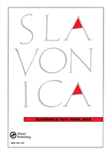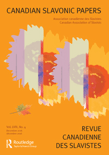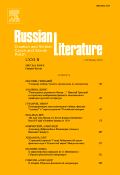
Mundo Eslavo-Journal of Slavic Studies
metrics 2024
Illuminating Contemporary Issues in Slavic Regions
Introduction
Mundo Eslavo - Journal of Slavic Studies is a prominent journal published by UNIV GRANADA, EDITORIAL, dedicated to advancing the field of Slavic studies through open access scholarship since 2004. With an ISSN of 1579-8372 and an E-ISSN of 2255-517X, the journal aims to provide a platform for interdisciplinary research, covering a wide array of topics including literature, culture, history, and linguistics of Slavic regions. Based in Granada, Spain, this journal is crucial for researchers, professionals, and students seeking to explore and contribute to the understanding of Slavic heritage and contemporary issues. With a commitment to accessibility and scholarly rigor, Mundo Eslavo invites submissions that push the boundaries of conventional discourse in Slavic studies, ensuring that critical insights and diverse perspectives reach a global audience.
Metrics 2024
 -
- -
- 0.10
0.10 -
-Metrics History
Rank 2024
JCI (Web Of Science)
Quartile History
Similar Journals

Slavia Meridionalis
Empowering research with accessible knowledge and insights.Slavia Meridionalis is a distinguished open-access journal published by the Polish Academy of Sciences, Institute of Slavic Studies, dedicated to advancing scholarly discourse in the fields of Anthropology, Cultural Studies, History, Linguistics and Language, and Literature and Literary Theory. With its ISSN 1233-6173 and E-ISSN 2392-2400, this journal has made significant strides in promoting research since its inception in 2014. Operating from Warsaw, Poland, Slavia Meridionalis aims to serve as a pivotal platform for researchers and students alike, fostering interdisciplinary collaboration and knowledge dissemination. The journal holds respectable rankings in its various categories, some achieving Q3 status, which reflects its commitment to quality scholarship within the academic community. By providing open access to its readership, Slavia Meridionalis ensures that pivotal research is readily available for the global audience, thus enhancing its relevance and impact across diverse fields.

Quaestio Rossica
Connecting Cultures through Innovative ResearchQuaestio Rossica is a prestigious academic journal published by URAL FEDERAL UNIVERSITY that focuses on a broad spectrum of the humanities, encompassing cultural studies, history, linguistics, literature and literary theory, as well as visual and performing arts. With an Open Access model since 2021, it provides unrestricted access to high-quality research articles, fostering a more inclusive platform for scholarly discourse. The journal has notably achieved Q1 rankings in key categories such as Cultural Studies and Literature and Literary Theory, highlighting its impact and relevance. With a commitment to advancing interdisciplinary dialogue, Quaestio Rossica serves as an essential resource for researchers, professionals, and students interested in exploring the rich complexities of human culture and expression. Based in the Russian Federation, it aims to bridge gaps in knowledge across various linguistic and cultural contexts, making its contribution invaluable in today's increasingly globalized academic landscape.

Listy Filologicke
Illuminating the Rich Tapestry of Language and Literary Theory.Listy Filologicke is a distinguished academic journal published by the Institute of Classical Studies at the Academy of Sciences of the Czech Republic, focusing on the interdisciplinary fields of History, Linguistics and Language, and Literature and Literary Theory. With an ISSN of 0024-4457 and an E-ISSN of 2570-9410, this journal has been a pivotal platform for scholarly discourse since its convergence years began in 2003. Notably, it holds a Q3 classification in History and Linguistics and Language, and a Q2 in Literature and Literary Theory as of 2023. Its rankings within Scopus illustrate its relevance and impact in academia, with noteworthy positions in the Arts and Humanities and Social Sciences categories. Researchers, professionals, and students will find Listy Filologicke an invaluable resource for exploring cutting-edge research, critical analyses, and discourse that contribute significantly to their respective fields. Based in the heart of the Czech Republic, it continues to promote scholarly excellence and foster international collaboration.

SLAVONICA
Illuminating Slavic Heritage Through Interdisciplinary InquirySLAVONICA is a distinguished academic journal dedicated to the exploration and analysis of Slavic studies, incorporating a wide array of cultural, historical, and linguistic perspectives. Published by Routledge Journals, Taylor & Francis Ltd, this journal serves as a critical platform for interdisciplinary scholarship, emphasizing the dynamic nature of Slavic cultures and languages. Though it currently does not offer Open Access, SLAVONICA is an important resource for researchers, professionals, and students seeking to engage with the latest academic discourse in the fields of Cultural Studies, History, Literature, and Linguistics, achieving a recognized place in the Q4 quartile across several categories as of 2023. With coverage spanning from 1994 to 2024, and its commitment to fostering academic inquiry, SLAVONICA plays a vital role in elevating the understanding of Slavic heritage and contemporary issues, making it essential reading for anyone interested in the complexities of this region.

Vestnik Slavianskikh Kultur-Bulletin of Slavic Cultures-Scientific and Informational Journal
Exploring the Depths of Slavic HeritageVestnik Slavianskikh Kultur-Bulletin of Slavic Cultures is a distinguished scientific and informational journal published by the State Academy of Slavic Culture. This journal, with ISSN 2073-9567, plays a pivotal role in the field of Slavic studies, providing a platform for the dissemination of cutting-edge research, cultural discourse, and scholarly analysis pertaining to Slavic cultures and civilizations. The journal aims to foster a deeper understanding of Slavic heritage, literature, and the societal dynamics shaping these cultures today. Although currently lacking an open access model, it remains an important resource for researchers, professionals, and students interested in the rich tapestry of Slavic traditions and contemporary cultural phenomena. With its thoughtful curation of articles, Vestnik Slavianskikh Kultur is poised to contribute significantly to ongoing scholarly conversations within the humanities.

Canadian Slavonic Papers
Advancing Knowledge in Slavic and Eastern European StudiesCanadian Slavonic Papers, published by Routledge Journals, Taylor & Francis Ltd, is an esteemed peer-reviewed journal dedicated to the exploration of the Slavic, Eastern European, and Russian domains, fostering scholarly dialogue across multiple disciplines. With a robust focus on Cultural Studies, History, Linguistics, and Literature, this journal has firmly established its presence in the academic community, as evidenced by its Q1 ranking across various categories in 2023. Since its inception, Canadian Slavonic Papers has been a vital platform for researchers, professionals, and students alike, providing an invaluable repository of knowledge and insights from 1977 to the present. While not an open-access journal, it remains accessible through institutional subscriptions, ensuring a wide dissemination of scholarship. Located in the United Kingdom, the journal continues to contribute significantly to the understanding of Slavic studies within a global context, making it essential reading for anyone invested in this dynamic field.

STUDIES IN EAST EUROPEAN THOUGHT
Fostering Scholarly Discourse on Eastern European IdeologiesSTUDIES IN EAST EUROPEAN THOUGHT is a premier academic journal published by Springer, focusing on the multifaceted intellectual heritage and cultural dynamics of Eastern Europe. Established in 1993, this journal has been a significant platform for scholarly discourse, promoting interdisciplinary research across the fields of Cultural Studies, Law, Literature, Philosophy, and Social Sciences. With an impressive impact reflected in its Scopus rankings, including a Q1 categorization in Literature and Literary Theory and a Q2 standing in Cultural Studies and Law, it remains at the forefront of academic research, contributing to the global understanding of Eastern European perspectives. The journal is available in both print (ISSN: 0925-9392) and electronic (E-ISSN: 1573-0948) formats, with a committed audience of researchers, professionals, and students eager to explore the intricacies of Eastern European thought. By engaging with diverse methodologies and contemporary issues, STUDIES IN EAST EUROPEAN THOUGHT continues to shape the academic landscape and elevate scholarly discussions surrounding this vibrant region.

RUSSIAN LITERATURE
Exploring the Depths of Russian Literary HeritageRUSSIAN LITERATURE is a premier academic journal published by ELSEVIER, dedicated to advancing the study of Russian literary traditions, critical theory, and cultural contexts. With an ISSN of 0304-3479 and an E-ISSN of 1878-3678, this journal has firmly established itself as a vital resource in the field, achieving a commendable Q1 ranking in Literature and Literary Theory as of 2023. The journal benefits from a strong impact factor and ranks #178 out of 1106 in the Scopus database, placing it in the 83rd percentile of arts and humanities research. RUSSIAN LITERATURE covers an extensive timeline, converging years from 1971 to 1974 and from 1976 to 2023, reflecting its rich academic lineage. Although not an open-access publication, the journal remains influential among scholars, professionals, and students seeking in-depth analyses and critical insights into Russian literature and literary theory. Its commitment to scholarly rigor makes it an essential read for anyone engaging with the complexities of literary studies.

Konstantinove Listy-Constantines Letters
Cultivating a vibrant community of researchers and thinkers.Konstantinove Listy - Constantines Letters is a premier academic journal published by the Constantine Philosopher University in Nitra, Slovakia. With a focus on the interdisciplinary exploration of historical, philosophical, and religious studies, this journal has established itself as a significant platform for scholarly discourse since its inception in 2015. The journal's impressive rankings—Q1 in History and Religious Studies, along with Q2 in Philosophy—demonstrate its commitment to high-quality research, concurrent with its strong performance in Scopus rankings, placing it in the 80th percentile for both Religious Studies and History disciplines. As an integral part of the academic landscape, Konstantinove Listy invites researchers, professionals, and students alike to contribute to its mission of advancing knowledge and understanding in these vital fields. While the journal operates under traditional publishing, it is recognized for its accessibility and contribution to fostering a vibrant scholarly community.

Studia z Filologii Polskiej i Slowianskiej
Illuminating the Nuances of Slavic LanguagesStudia z Filologii Polskiej i Slowianskiej is a prominent journal published by the Polish Academy of Sciences, Institute of Slavic Studies, focusing on the rich and diverse field of linguistics and language studies, particularly within the Slavic context. With the ISSN 0081-7090 and E-ISSN 2392-2435, this open-access journal has been a valuable resource for researchers, professionals, and students since its transition to an open-access model in 2014. It features rigorous peer-reviewed articles that contribute to the understanding of linguistic phenomena and cultural narratives across Slavic languages. Recognized within the Q3 quartile of linguistics and language in 2023, it ranks at the intersection of arts, humanities, and social sciences, providing insights that echo through disciplines such as sociolinguistics, psycholinguistics, and philology. In its ongoing publication trajectory from 2011 to 2023, Studia z Filologii Polskiej i Slowianskiej continues to foster academic discourse and collaboration, positioning itself as a key player in the global linguistic community.